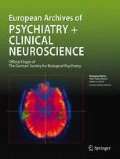Abstract
This report from the WHO project on Psychological Problems in General Health Care examines the relevance in primary care of the concept of recurrent brief depression (RBD) proposed by Jules Angst. RBD refers to brief, severe depressive episodes that recur frequently, i.e. nearly once a month over, a 1-year period, according to Angst. Using a structured interview (CIDI), RBD was assessed in patients not meeting the criteria for depressive episodes lasting at least 2 weeks, as defined in the ICD-10 (DE). A substantial proportion of primary care seekers were identified as presenting RBD without other depressive disorders, 3.7% with a formal RBD diagnosis and 2.7% with frequent but not monthly depressive episodes. These two subgroups were found to differ very little in terms of sociodemographic characteristics, severity, disability, and comorbidity with other diagnoses. However, in patients with a formal diagnosis of RBD, a higher rate of history of suicide attempts was found (14.0%), similar to that observed in patients meeting the criteria for DE. Most of the severity and disability indicators show that RBD is a severe condition, associated with substantial impairment, even if they show a higher degree of severity for DE. About one RBD patient out of three is recognized by general practitioners as presenting a psychological disorder, a majority of whom are atually treated. Our results confirm the relevance of the concept of RBD in primary care, and the need to further, explore the pertinence of the restrictive recurrence criterion proposed by Angst.
Similar content being viewed by others
References
American Psychiatric Association, Task Force on DSM-IV (1993) DSM-IV Draft Criteria 3/1/93. American Psychiatric Association, Washington, DC
Angst J, Dobler-Mikola A (1985) The Zurich study. A prospective epidemiological study of depressive, neurotic and psychosomatic syndromes. IV. Recurrent and non recurrent brief depression. Eur Arch Psychiatry Neurol Sci 234:408–416
Angst J, Merikangas K, Scheidegger P, Wicki W (1990) Recurrent brief depression: a new subtype of affective disorder. J Affect Disord 19:87–98
Barrett JE, Barrett JA, Oxman T, Gerber PD (1988) The prevalence of psychiatric disorders in a primary care practice. Arch Gen Psychiatry; 45:1100–1119
Blacker CVR, Clare AW (1988) The prevalence and treatment of depression in general practice. Psychopharmacology 95:14–17
Goldberg D, Williams P (1988) A users guide to the General Health Questionnaire: GHQ. Windsor: NFER-NELSON
Maier W, Herr R, Gänsicke M, Lichtermann D, Houshang K, Benkert O (1994) Recurrent brief depression in general practice: clinical features, comorbidity with other disorders, and needs for treatment. Eur Arch Psychiatry Clin Neurosci (in press)
Montgomery SA, Montgomery D, Baldwin D et al (1989) Intermittent 3-day depressions and suicidal behaviour. Neuropsychobiology 22:128–134
Montgomery SA, Montgomery D, Baldwin D, et al (1990) The duration, nature, and recurrence rate of brief depressions. Prog Neuro-Psychopharmacol Biol Psychiatry 14:729–735
Sartorius N, Ustün TB Costa e Silva JA, Goldberg D, Lecrubier Y, Ormel H, Korff M von, Wittchen H-U and the investigators in the WHO Collaborative Study on Psychological Problems in General Health Care (1993) An International Study of Psychological Problems in Primary Care. Preliminary report from the WHO Collaborative Project on “Psychological Problems in General Health Care”. Arch Gen Psychiatry 50:819–824
Schulberg HC, Saul M, McClelland M, Gnaguli M, Christy W, Frank R (1985) Assessing depression in primary medical and psychiatric practices. Arch Gen Psychiatry 42:1164–1170
Stewart AL, Hays RD, Ware JE (1988) The MOS short form general health survey: reliability and validity in a patient population. Med Care 26:724–735
Ustün TB, Sartorius N (1993): An International Study of Psychological Disorders in 14 Countries: Standardized Assessment of III-Defined Problems in Primary Care. In: Miranda J, Hohman A, Atkinson C, Larson D (eds) Mental Disorders in Primary Care. Jossey-Bass Co, New York (in press)
Ware JEJ, Sherbourne CD (1992) The MOS 36-item short-form health survey (SF-36). I. Conceptual framework and item selection. Med Care 30:473–483
Weiller E, Boyer P, Lépine J-P, Lecrubier Y (1994) Prevalence of recurrent brief depression in primary care. Eur Arch Psychiatry Clin Neurosci (in press)
World Health Organization (1991) The Composite International Diagnostic Interview (CIDI). Modified version for the WHO multisite collaborative project on Psychological Problems in General Health Care
World Health Organization (1992) The ICD 10. Classification of Mental and Behavioural Disorders. Clinical Descriptions and diagnostic guidelines. WHO, Geneva
Author information
Authors and Affiliations
Rights and permissions
About this article
Cite this article
Weiller, E., Lecrubier, Y., Maier, W. et al. The relevance of recurrent bried depression in primary care. Eur Arch Psychiatry Clin Nuerosci 244, 182–189 (1994). https://doi.org/10.1007/BF02190396
Received:
Accepted:
Issue Date:
DOI: https://doi.org/10.1007/BF02190396




